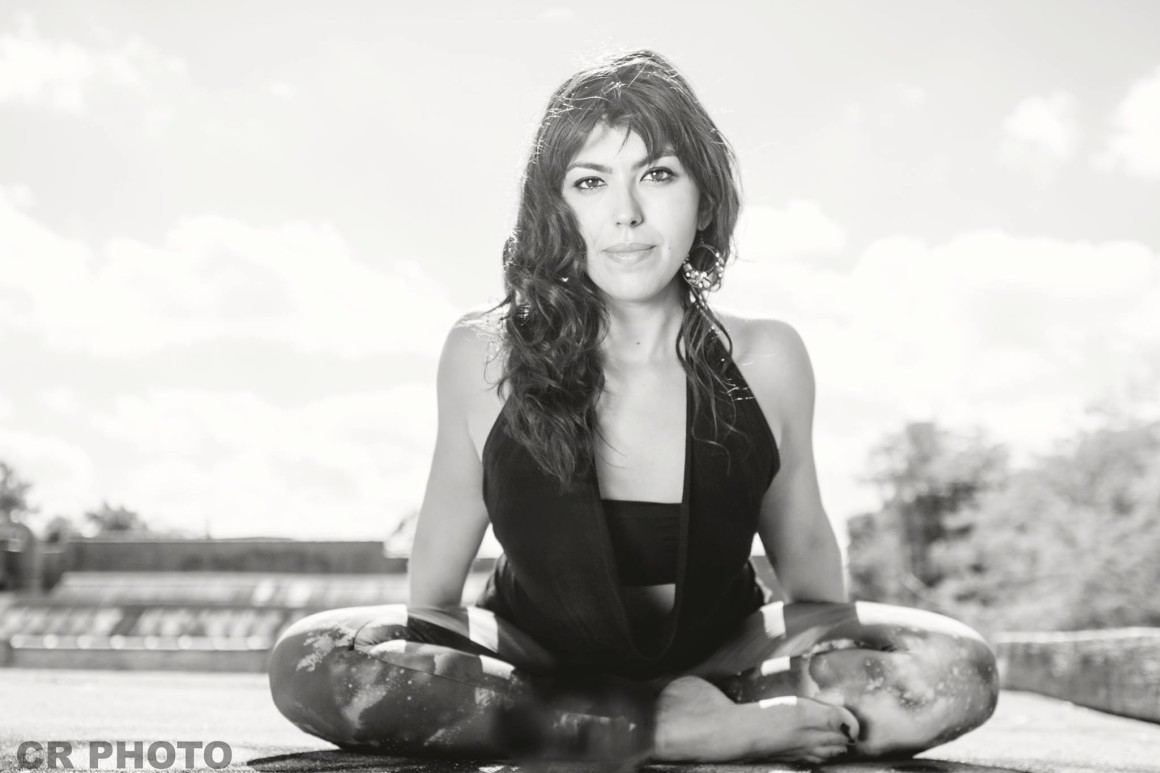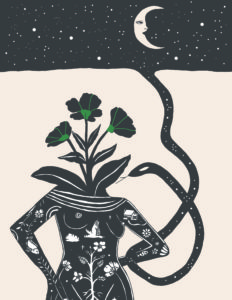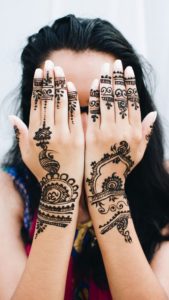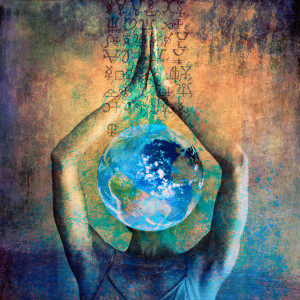Growing up, my body felt like my despised enemy. It was slow, overweight, and the reason I was mercilessly outcast by my peers. My body became a place I never wanted to inhabit, which is a slippery slope. After anxiety, disordered eating, a sexual assault, and depression, I now realize how disconnected I was from my form and what my body was telling me.
Discovering yoga in high school and eventually earning my 200-hour teacher training at 24 elevated my relationship with my body. Instead of a despised tormentor, it became an obnoxious roommate. I was OK most of the time, but I still harbored a constant undercurrent of irritation, disappointment, and—if I thought about it for too long—anger.
But my spiritual practice was in overdrive. I fell down the rabbit hole of spiritual seeking and devoured every teaching I could get my hands on. I delighted in following the gold thread to new teachers, practices, and texts.
It was Miranda Shaw’s “Passionate Enlightenment” that mesmerized me with its vivid portraits of female tantric adepts. They were feral, unapologetic, audacious, spiritually enlightened, and free. They didn’t sit in robes in silent meditation for innumerable hours, completely removed from the earthly plane. They rejoiced in their earthly forms: They were mischievous, dancing skyclad, laughing raucously and penning bizarre, surrealist poetry inspired by their inner journeys. To me, these images were liberation. They gave me permission to delight in spiritual seeking, for my practice to become a coquettish exploration into forgotten dimensions, veiled wisdom, and captivating sensation.
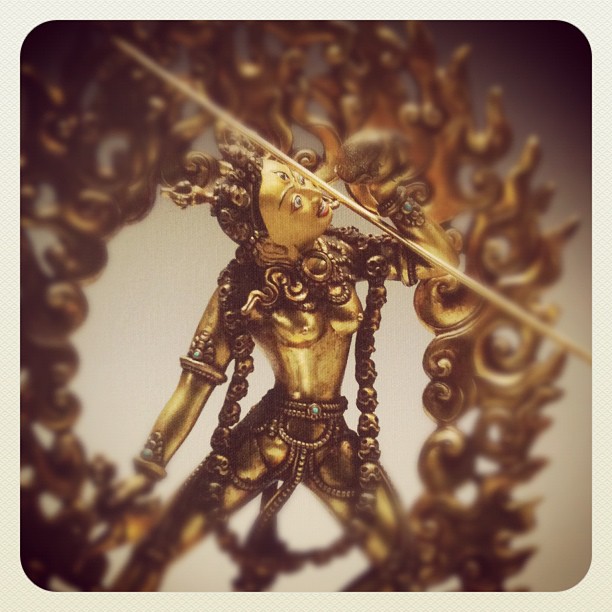
Then I read this passage from the book: “Wherever in the world a female body is seen, that should be recognized as my holy body.” It was announced by Vajrayogini, the Tibetan representation of supreme Buddhahood in all her blood-red, wild-haired female form. She declares this as a reminder to all women that enlightenment isn’t only possible for us, it is our natural state, etched into our bones.
My breath caught in my throat upon that initial read. Then I read it again. And again. And over and over.
What a thought: The female form, in all its infinite incarnations, is sacred. Flabby arms, flat tummies, the magnificent spectrum of colors of our flesh, speckled noses, long toes, lean thighs, stubby fingers, beauty marks, cellulite, and adorable belly buttons. All equally divine.
This declaration meant that not only should all female forms be celebrated and revered as reflections of sacred femininity, but it would be blasphemy to not treat the female form as such, including your own.
That night, I stripped naked and stood in front of my full-length mirror. The old, cutting thoughts were at the ready, flooding my mind like they had done for as long as I could remember. Had they always been there? No. What was there before them?
The image of my reflection drifted in and out of focus as I let the barrage of vilifications wash over me, as if they were separate from my own voice and thoughts, as if they never belonged to me in the first place, and my reflection became blurry with tears.
She is you: a tiny murmur barely perceivable amid the onslaught of criticisms. You are her.
So hum. I am that.
The body is a gift to experience the sensory world: bitter dandelion leaf, warm sunshine, the awkward caress of a new lover. The body is a vessel for the divine to work through us, to teach us, to guide us. How dare we judge, starve, and berate this gift? We have collectively rejected this divinely bestowed form because we have been tricked by fear. Not even our own fear, but others’ fear, for the female body is a powerful, mystical, and mysterious entity. This has led women to a tortured state of soul loss in the form of eating disorders, body dysmorphia, and the compulsion to fit into a mold that never truly existed in the first place. Our intimate connection to the divine has been labeled dirty, ugly, and not good enough.
But this connection can be revived, healed, and invigorated. To this day, I use the mantra that came to me that night in the mirror. In the morning, I sit on my cushion and with every inhale repeat: She is you. With every exhale: You are Her. I imagine myself as a vessel filling with a voluptuous, glittering, warm amber honey-nectar, and I become a conduit for her to use my tongue to speak, my hands to do her work, my eyes to reflect her divine light, allowing others to see their own.
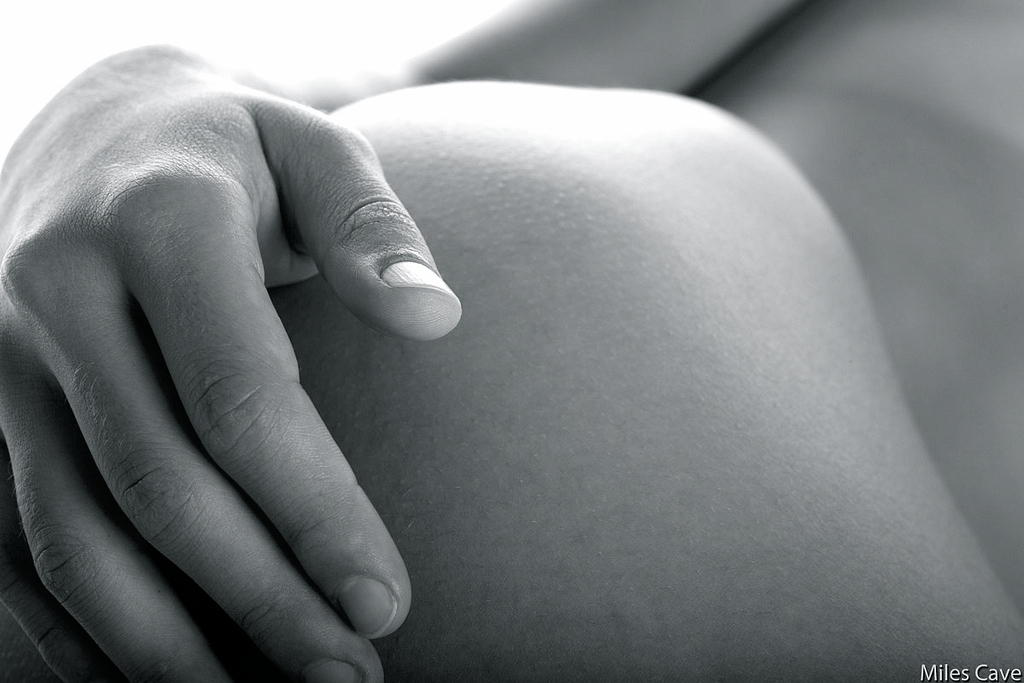 Holding onto this mindset in our culture is constant work. This raw, untainted lens requires me to be brave. My body, as it is, challenges the status quo in a way that I cannot diet or exercise away; I've tried, and she is resolute to this incarnation. She is brazen with her exuberant hips, defiant with her bony shoulders, receptive with her soft belly, and relentless with her thighs like tree trunks. She is unflinchingly my truth when I can't seem to muster the courage to speak it myself. She is more myself than I am.
Holding onto this mindset in our culture is constant work. This raw, untainted lens requires me to be brave. My body, as it is, challenges the status quo in a way that I cannot diet or exercise away; I've tried, and she is resolute to this incarnation. She is brazen with her exuberant hips, defiant with her bony shoulders, receptive with her soft belly, and relentless with her thighs like tree trunks. She is unflinchingly my truth when I can't seem to muster the courage to speak it myself. She is more myself than I am.
This is why I have to catch those old criticisms before they manifest into a whole thought, why I’ve stopped the “fat talk” with friends, glorifying how few calories I’ve consumed and how much time I’ve spent at the gym on any given day. Instead of doing punishing exercise, mindful movement is now a part of my daily routine, and my asana practice has become a prayer. Instead of restricting and tallying up food, I eat what is nourishing to my body and soul, not too little and not too much. Inhabiting my body—really feeling it—has placed pleasure as a top priority; I treat myself preciously, giving myself over to the delight of a glass of wine, my toes in the grass, and the company of a tribe who laughs until our ribs hurt.
The biggest difference, though, is that when I am quietest, I am grateful to her, my body. I feel proud that I am my own. That I am home.
Photos: Raquel Scianna by Chelsea Ross Photography, Vajrayogini by bwaters23 on Flickr (cc), Gentle by Miles Cave on Flickr (cc).

